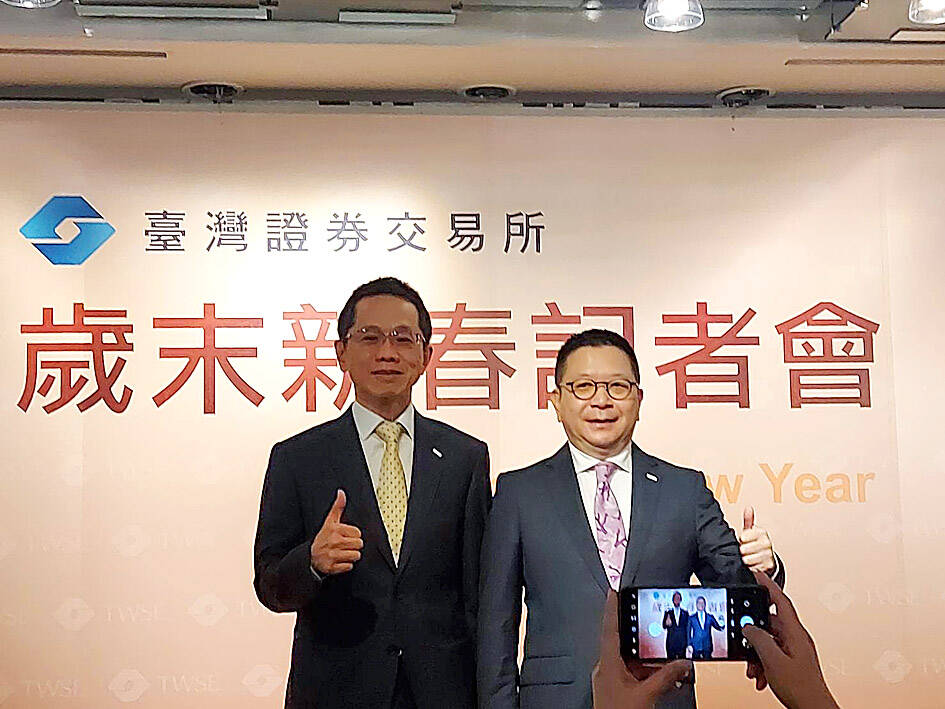The Taiwan Stock Exchange (TWSE) is looking to strengthen its market capitalization and liquidity this year by boosting the TAIEX’s presence at home and abroad, among other measures, TWSE chairman Sherman Lin (林修銘) said at a media briefing in Taipei yesterday.
Lin said he is seeking another 5 percent gain in market capitalization to NT$60 trillion (US$1.93 trillion), from NT$56.84 trillion last month, making the local bourse more attractive and liquid.
“The TWSE is to prioritize boosting the local bourse’s capitalization and liquidity as they sit atop the list of concerns of investors,” alongside companies’ earnings ability, business outlook and dividend policy, he said.

Photo: Chen Yung-chi, Taipei Times
The exchange would work with JPMorgan Asset Management Ltd, HSBC Holdings PLC, Goldman Sachs Group Inc and several other foreign securities houses and custodian banks to jointly woo foreign investment funds and amplify the exposure of local firms, Lin said.
Officials from the exchange and the Financial Supervisory Commission last year visited Singapore, Japan and the US to help the local bourse better connect with other international capital markets, he said.
Exchange officials would visit investment institutions in the UK, EU and Middle East later this year to promote Taiwanese equities and add momentum to the local bourse, he said, adding that they are targeting listed firms with a capitalization of more than NT$10 billion.
The TAIEX last year moved from a trough of 14,000 points to finish at 17,930.81, logging a 26.8 increase that was second only to Japan’s Nikkei 225 Index and stronger than the Dow Jones Industrial Average, S&P 500 and indices in Europe, Lin said.
That was despite aggressive monetary tightening by major central banks to tame inflation and intensifying geopolitical tensions, he said.
Daily turnover averaged NT$281.2 billion last year and there is still room for improvement this year, Lin said.
The local bourse last year had 12.51 million participants, accounting for 53 percent of the nation’s population, with those aged 20 to 30 making up half of the total, TWSE data showed.
Foreign funds own 40.60 percent of local shares after increasing their holdings by a net NT$275.4 billion last year.
The pace sharpened to NT$420 billion in November and last month, suggesting capital outflows in previous months.
Last year, 42 firms filed initial public offering applications, with 28 being approved and raising a total of NT$33.76 billion, the exchange said.
The exchange’s new trading platform for start-ups, the Taiwan Innovation Board, last year processed 14 listing applications with 10 making it onto the board, it said.
While only qualified investors are allowed to buy shares listed on the new trading platform, given the higher risks involved in investing in start-ups, the number of qualified investors more than doubled to 272,000 last year, it added.

Taiwan will prioritize the development of silicon photonics by taking advantage of its strength in the semiconductor industry to build another shield to protect the local economy, National Development Council (NDC) Minister Paul Liu (劉鏡清) said yesterday. Speaking at a meeting of the legislature’s Economics Committee, Liu said Taiwan already has the artificial intelligence (AI) industry as a shield, after the semiconductor industry, to safeguard the country, and is looking at new unique fields to build more economic shields. While Taiwan will further strengthen its existing shields, over the longer term, the country is determined to focus on such potential segments as

UNCERTAINTY: Innolux activated a stringent supply chain management mechanism, as it did during the COVID-19 pandemic, to ensure optimal inventory levels for customers Flat-panel display makers AUO Corp (友達) and Innolux Corp (群創) yesterday said that about 12 to 20 percent of their display business is at risk of potential US tariffs and that they would relocate production or shipment destinations to mitigate the levies’ effects. US tariffs would have a direct impact of US$200 million on AUO’s revenue, company chairman Paul Peng (彭雙浪) told reporters on the sidelines of the Touch Taiwan trade show in Taipei yesterday. That would make up about 12 percent of the company’s overall revenue. To cope with the tariff uncertainty, AUO plans to allocate its production to manufacturing facilities in

COLLABORATION: Given Taiwan’s key position in global supply chains, the US firm is discussing strategies with local partners and clients to deal with global uncertainties Advanced Micro Devices Inc (AMD) yesterday said it is meeting with local ecosystem partners, including Taiwan Semiconductor Manufacturing Co (TSMC, 台積電), to discuss strategies, including long-term manufacturing, to navigate uncertainties such as US tariffs, as Taiwan occupies an important position in global supply chains. AMD chief executive officer Lisa Su (蘇姿丰) told reporters that Taiwan is an important part of the chip designer’s ecosystem and she is discussing with partners and customers in Taiwan to forge strong collaborations on different areas during this critical period. AMD has just become the first artificial-intelligence (AI) server chip customer of TSMC to utilize its advanced

Chizuko Kimura has become the first female sushi chef in the world to win a Michelin star, fulfilling a promise she made to her dying husband to continue his legacy. The 54-year-old Japanese chef regained the Michelin star her late husband, Shunei Kimura, won three years ago for their Sushi Shunei restaurant in Paris. For Shunei Kimura, the star was a dream come true. However, the joy was short-lived. He died from cancer just three months later in June 2022. He was 65. The following year, the restaurant in the heart of Montmartre lost its star rating. Chizuko Kimura insisted that the new star is still down